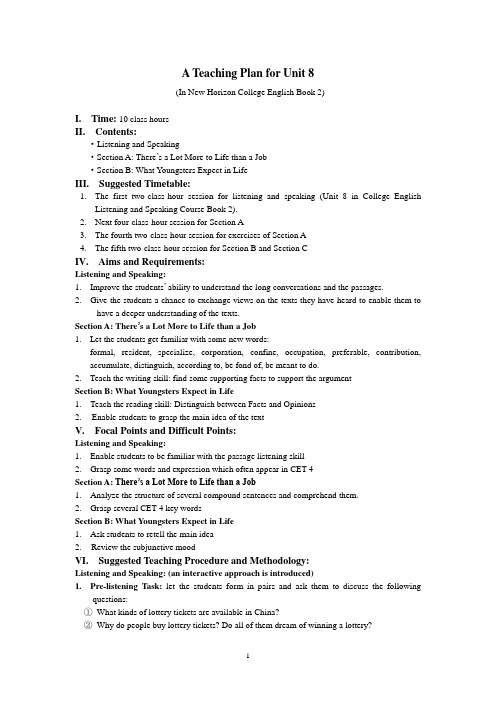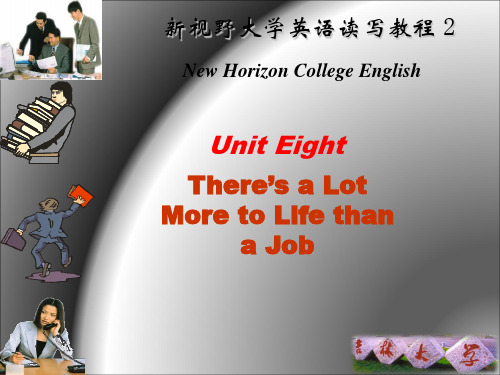新视野大学英语第二版第二册第八单元课件unit 8
- 格式:ppt
- 大小:434.00 KB
- 文档页数:14

A Teaching Plan for Unit 8(In New Horizon College English Book 2)I. Time:10 class hoursII. Contents:·Listening and Speaking·Section A: There’s a Lot More to Life than a Job·Section B: What Youngsters Expect in LifeIII. Suggested Timetable:1.The first two-class-hour session for listening and speaking (Unit 8 in College EnglishListening and Speaking Course Book 2).2.Next four-class-hour session for Section A3.The fourth two-class-hour session for exercises of Section A4.The fifth two-class-hour session for Section B and Section CIV. Aims and Requirements:Listening and Speaking:1. Improve the students’ ability to understand the long conversations and the passages.2. Give the students a chance to exchange views on the texts they have heard to enable them tohave a deeper understanding of the texts.Section A: There’s a Lot More to Life than a Job1.Let the students get familiar with some new words:formal, resident, specialize, corporation, confine, occupation, preferable, contribution, accumulate, distinguish, according to, be fond of, be meant to do.2.Teach the writing skill: find some supporting facts to support the argumentSection B: What Youngsters Expect in Life1. Teach the reading skill: Distinguish between Facts and Opinions2.Enable students to grasp the main idea of the textV. Focal Points and Difficult Points:Listening and Speaking:1. Enable students to be familiar with the passage listening skill2. Grasp some words and expression which often appear in CET-4Section A: There’s a Lot More to Life than a Job1. Analyze the structure of several compound sentences and comprehend them.2. Grasp several CET-4 key wordsSection B: What Youngsters Expect in Life1. Ask students to retell the main idea2.Review the subjunctive moodVI. Suggested Teaching Procedure and Methodology:Listening and Speaking: (an interactive approach is introduced)1. Pre-listening Task:let the students form in pairs and ask them to discuss the followingquestions:①What kinds of lottery tickets are available in China?②Why do people buy lottery tickets? Do all of them dream of winning a lottery?③Have you or your relatives ever won a lottery? If so, what did you or they do with the prizemoney?Some key words and expressions in Language Focus:lottery: n. 抽奖给奖法(发行彩票或奖券,然后抽出获奖者)bowl: v. 打保龄球2.Background Information:Lottery tickets are issued in many countries. Lotteries are administered by governments.Part of the revenue generated by the sale of lottery tickets is used for supporting educational, charitable and religious enterprises and for maintaining public buildings. The rest is used for the prizes and administrative expenses. The prize is carried forward to the next draw if no one wins the prize.3.Listening to text 1 and 24.Speaking Tasks: ask the students to get into pairs and explain to them how to carry outSpeaking Task A- Reflections on the texts, and then select a pair to present their views in class.Section A There’s a Lot More to Life than a Job1. Background Information:①Robins Resident Center is a service/training center for the U.S. Air Force, which is locatedin Macon State College. For specific information about the Center, you can check out the web page at /about/rrc-map.asp and /fsc/fscweb-page/rap/resident-center.htm. You can also visit the web site for some information about Macon State College.②Oscar Wilde (1854-1900), the son of an eminent Dublin surgeon, was among theoutstanding Victorian dramatists. He is renowned for a brilliant series of domestic comedies -- Lady Windermere’s Fan(1892), A Woman of No Importance(1893), and An Ideal Husband(1894). To learn more about Oscar Wilde, check out the web site at http://65.107.211.206/victorian/decadence/wilde/wildeov.html. Additional annotated links t web sites about Wilde can be found at /tots/gross/wildeweb.html. 2. Pre-reading ActivitiesListen to short passage twice and answer questions①How do young students and older teachers see the role of education differently?②What is “quality of life” and how can it be improved?③According to the writer, what must educators prepare students for?听力原文:Should schools simply prepare students for a job, or is there more to life? This is the focus of the following article. According to the author, educational institutions face a difficult choice. Most young students only want t learn what is needed for career success. Educators, on the other hand, have lived long enough to realize that quality of life is not entirely determined by a balance sheet. Human beings have collected a great amount of knowledge in many different fields, and people can lead better lives if they understand these things. The author tells of a cartoon wherebusinessmen are having difficulty tilling “right from wrong”. He concludes that educators must prepare students for such difficulties, as well as preparing them for a job.Answers:①How do young students and older teachers see the role of education differently?Most young students only want t learn what is needed for career success. Educators, on the other hand, have lived long enough to realize that quality of life is not entirely determined by a balance sheet.②What is “quality of life” and how can it be improved?The quality of life is not entirely determined by a balance sheet. Human beings have collected a great amount of knowledge in many different fields, and people can lead better lives if they understand these things.③According to the writer, what must educators prepare students for?educators must prepare students for telling right from wrong, as well as preparing for a job.3.Work on Section AA) Structure of the Text ( a method of analyzing the text structure is employed)Part I (Paras1-3) Introduction: People regret that youth is wasted by young people.Part II (Paras 4-18) Main body: Today’s college beginners are more consumeristic and less idealistic than before. We can educate people for life as well as for a career. Education helps us to see what is beyond our immediate needs.Part III (Paras 19) Conclusion: Convince students that there’s a lot more to life than a job.B) Raise some questions to make students grasp some detailed information in the text(question and answer method is used)Part I (Paras. 1-3):Questions: -What’s the main idea of the writer?What is the conclusion drawn from the survey based on the responses from over188,000 students?Answers: The youth is wasted on the young.Today’s college beginners are “more consumeristic and less idealistic”than at any time in the seventeen years of the poll.Part II (Paras. 4-18)Questions: What do most people between 30 and 50 finally become aware of?What is the implication of the cartoon mentioned in the text?What is the implication of the cartoon mentioned in the text?Answers: Work is not the only thing they live for, and they are meant to do more.Without proper education, it will be more and more difficult for people to developtheir moral sense.Without proper education, it will be more and more difficult for people to develop their moral sense.Part III (Paras 19)Question: What is the writer’s hope for education?Answer: He hopes educators will not only prepare students for a career but also help them realize that there is a lot more to life than a job.4. Language PointsPart I (Para 1-3)①It has often been remarked that the saddest thing about youth is that it is wasted on the young. (Para.1)Meaning: It has often been said that the saddest thing about youth is that youth, i.e. the opportunities, good health, etc. that are available when people are young, are wasted or not appreciated by young people.②…“If only I knew then what I know now.”(Para 2)if only:1)used to express a wish that past events had been differente.g. If only I had gone by taxi. 要是我乘出租车去就好了。

Unit 8 Section A There’s a Lot More to Life than a Job1. Pre-reading1. 1 Background informationHumanities (人文科学) In the context of the reading passage, humanities refers to a broad academic discipline. It includes such areas of study as Philosophy, Literature, Religion, Art, etc. humanities programs at U.S. universities are most often housed in the College of Liberal Arts.在本文中指广义的人文学科,包括哲学\文学\宗教\艺术等。
在美国的大学里,人文学科常包含在文理学院内Associate degree (准学士学位)Associate degree is awarded to a student after he or she finishes a 2-year study at a junior college in the U.S. 美国学生在读完两年制职业专科学校时会被授予准学士学位。
Education in the United Stated (美国的学校制度)It is usually divided into 4 levels: kindergarten / pre-school, elementary, secondary, and higher education. The first is early childhood education, which is to prepare children for school. The second is elementary education, being divided into 6 or 8 grades. The third level is secondary education for junior or senior high school students. Some prepare themselves to go to college, while others take vocational / technical courses to prepare for jobs after graduation. There are many institutions of higher education in the U.S. Students at technical institutes can receive an associate degree after a 2-year program, then they can continue their study at a 4-year college.美国学校分学龄前,小学,初\高中,和高等教育四个程度。




Unit 8 Women at the management levelNew words:administrativea. 行政的;管理的administrative assistantn. 行政助理attorneyn. 律师employeen. 受雇者;雇员accommodationn. 1 迁就;通融;调和;2 住处;工作场所segmentn. 部分;段;片tolerancen. 1 忍受;容忍;宽容;2 (对痛苦、困难等的)忍受程度,忍耐力disposevt. 1 使(某人)较倾向于;2 丢弃,处理(尤指难以处理的东西)disposeda. 有…倾向的sectorn. (尤指商业、贸易等的)部门,行业public sectorn. 公营部门;国营部门precedevt. 先于…(发生或存在)mumpsn. 腮腺炎flourishvi. 1 繁荣;兴旺;成功;2 茁壮成长bystandern. 旁观者;局外人;看热闹的人harnessvt. 利用;控制symbolica. 象征的;象征性的plausiblea. 可能正确的;有道理的hierarchicala. 按等级划分的diplomatica. 1 讲究手腕的;灵活变通的;2 外交的;从事外交工作的diplomaticallyad. 讲究手腕地;灵活变通地;外交地discriminationn. 歧视petroleumn. 石油exportn. 出口v. 出口acren. 英亩countyn. (英国的)郡;(美国等国家的)县erecta. 直立的;垂直的vt. 竖起cashiern. 出纳员;收银员auctionn. 拍卖concessionn. 妥协;迎合marinea. 海洋的;海产的;海生的n. 水兵;(英国/美国)海军陆战队士兵extentn. 程度;限度;范围vice-prefix 表示“副”(用于高级职位的名称前,表示仅次于这个职位的职位)weaponn. 武器;兵器;凶器infervt. (根据资料)推断,退定violatevt. 1 打扰;侵犯;侵害;2 违背;违反;侵犯valida. 1 有根据的;令人信服的;2 有效的;正式认可的offensen. 得罪;冒犯行为veilvt. 遮盖;掩饰n. 面纱composevt. 1 使自己镇静下来;2 由…组成composeda. 镇静的;镇定的headquartersn. 部;总公司;总办事处identicala. 完全相同的;非常相似的cooperativea. 合作的contextn. 1 场合;周围情况;环境;背景;2 上下文;语境scanvt. 1 扫描;2 粗略地看;浏览disputen. 争论;辩论;争端;纠纷consultantn. 顾问vaguea. 含糊的;不明确的;不清楚的vaguelyad. 1 模模糊糊地;不明确地;2 稍微;有点Phrases and expressions:be disposed to do sth.愿意做某事;乐于做某事on both counts在两个方面take over接管;接任;接受take a liberty / liberties with sb.与某人相处时太放肆feel at ease with sb.(与某人在一起)感到放松,不拘束make a concession / concessions to为对某事或某想法取得一致意见作出妥协to some extent在某种程度上come down to归结为burst into突然迸发(尤指开始唱歌、哭、笑等)take exception to sth.因某事而生气(烦恼)stem from源于;来自;由于…发生Women at the management level1 When Monica applied for a job as an administrative assistant in 1971, she was asked whether she would rather work for a male or a female attorney. "I immediately said a man," she says. "I felt that a male-boss/female-employee relationship was more natural, needing no personal accommodation whatsoever." But 20 years later, when she was asked the same question, she said, "I was pleasantly surprised that female bosses are much more accessible to their employees; they're much more sensitive and intimate with their employees."2 Female bosses today are still finding they face subtle resistance. There is still a segment of the population, both men and, surprisingly, women who report low tolerance for female bosses. The growing presence of female bosses has also provoked two major questions that revolve around styles: Do men and women manage differently, and, if so, is that a good thing?3 Monica is disposed to think so, on both counts. Now a 40-year-old mother of four, she is president of a public sector labor union with 45,000 members. "Relations with my employees are probably different from those of male managers preceding me," she says. "I know what it's like to have to call and say my kid got the mumps so I won't be coming in. I have a more flexible style — not soft, just more understanding." The man who is Monica's assistant agrees, "She tends to delegate more and is always looking for a consensus. People are happy and flourish because they have an input into decisions and they are not mere bystanders; their energies are harnessed. On the other hand, consensus takes longer."4 So, are the differences symbolic or real? Plausible studies suggest that men are typically hierarchical, goal-oriented and feel entitled. Women, by contrast, managediplomatically, and share power. That point of view is often challenged and argued. Some proclaim that men and women of similar backgrounds, experience and aspirations basically manage in the same way. This view is echoed by younger women, especially those who have encountered little gender discrimination. That was certainly the lesson for Nicole. When her father died of a heart attack, she was an employee at a petroleum products export company. She quit and took over her family's 160-acre fruit farm in St. David's County. On her first day in the field, a worker called her "darling". "He was trying to test me. I was shaking with anger," says Nicole, now 34. "I stood erect and said, 'You wouldn't have called my father darling and you're not going to take that liberty with me. If you do, I'll fire you.'"5 When women work for women, a different dynamic often takes over. Susan, a cashier in a Toronto auction house, says that she has explored friendships with some of her female bosses and feels she can rely on them more. While women may feel more at ease with a female boss, men often have to make concessions to the new working styles. Brian, a marine biologist, says, "It took me a couple of years before I felt comfortable enough to relax around a female manager. In fact, my relations with her were much more businesslike."6 To some extent, the male-female differences come down to conflicting styles. One female vice-president discussed the time she burst into tears during a meeting. "Men think that tears are a nuclear weapon in a conventional war. They take exception to a woman crying, inferring that she's feeling unhappy or violated." The men failed to understand that what prompted her tears was not hurt but genuine rage. "When we cry, it's because we have all this valid rage that has no appropriate release," she says. "Women cry; men get relief by going on with the offense or by veiling their feelings to appear composed."7 Deborah, president of a firm with its headquarters in Toronto, says that even if men do understand, they sometimes react differently to the identical information and to her cooperative management style.8 Deborah says that her authority is sometimes undermined by perceptions about her gender. "It stems from the whole social context of traditional roles for men and women," she says. "Mom would tell you to do things, but perhaps you wouldn't take as much notice as when Dad told you to do things. Men also have a stronger urge to control," she says.9 For female bosses, the great expectation of some female employees is one more obstacle. Junior women assume a female boss will promote them more quickly than a man would. But, they also expect female bosses to be more self-sufficient. "They ask, 'Why can't you scan your own stuff?' or 'Why can't you do your own filing?'" says one senior female executive.10 On the other hand, there is no dispute that a few decades ago they would rarely have had a female boss in the workplace. Nina, a management consultant says she's vaguely optimistic. "I'm looking forward to the day, before I die, when we recognize that the best management styles will be composed of the best that both genders bring to the table ..." Well, she pauses, maybe not before she dies, perhaps in her daughter's lifetime.当莫妮卡1971年申请一个行政助理的工作时,有人问她想与男律师共事还是与女律师共事。